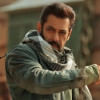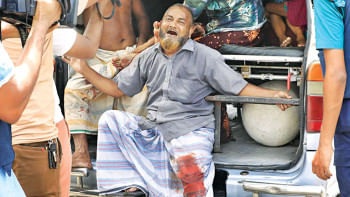Movie Review: Padmaavat
There are three disclaimers before even a frame of "Padmaavat" is shown on screen. All kinds of adjectives and verbs are used to make sure the audience knows the film is based on Malik Muhammad Jayasi's epic poem, "Padmavat", and that the film does not intend to hurt anyone's sentiment. That's understandable given that street protests against the film have turned increasingly violent, with reports of vandalism around a number of multiplexes in Gujarat on Tuesday, and more protests planned by Hindu groups who accuse director Sanjay Leela Bhansali of distorting history.
Much like his last film, "Bajirao Mastani", Bhansali again chooses to showcase his own particular version of history, one that is airbrushed and beautified, almost beyond recognition. Palaces are majestic and alit at all times, characters are dressed in the most ethereal of clothes, and there is the customary operatic dance sequence that is beautifully choreographed.
As a cinematic spectacle, "Padmaavat" cannot be faulted – it is singularly beautiful - but the beauty, unlike its titular character, is merely skin deep. Queen Padmavati (Deepika Padukone), whose story the film purports to tell, is anything but a superficial beauty. She values virtue over looks, and can plan wars and anticipate an enemy's moves better than her warrior husband. Yet, we only get a glimpse of what is supposed to be a multi-dimensional personality. For the most part, the queen is reduced to a one-tone portrait of devotion to her Rajput husband, Rawal Ratan Singh (Shahid Kapoor).
Ratan Singh is even more vanilla than Padmavati, content with spouting platitudes about valour and honour. In contrast with the unscrupulous Alauddin Khilji, he sounds even more prudish and condescending. Together with Padmavati, Ratan Singh weighs down the film.
Stripped away of all the paraphernalia, "Padmaavat" is at its heart the story of Queen Padmavati and the Muslim invader Alauddin Khilji, who, on hearing about her beauty, wages two wars and kills countless people just so he can "conquer" her. But unlike Bhansali's earlier films, where he was able to find emotional depth even in opulent historical romances, this one falls short.
Padukone and Kapoor's tepid screen chemistry is as much to blame for this, as is Bhansali's apparent obsession with Khilji, who is the centre of his eyes and, therefore, of the film. To make a man as repulsive as Khilji a main character and to etch him out with such detail is perhaps Bhansali's biggest achievement.
Khilji is depraved, crazed, perverted and violent, and yet he is the most interesting character in the film. Credit for that goes to Ranveer Singh, who gives in to Khilji's unhinged personality and makes it his own. His scenes with Jim Sarbh (who plays his aide and consort) are an unabashed portrayal of male romance, something we have never seen before in Hindi cinema. This is a strong, author-backed role, but Singh elevates it further by injecting his own brand of energy and a disregard for rules to give us an antihero who is different from the cookie-cutter villains we see on screen.
It is Singh's performance that is the highlight of the film. If it wasn't for the villain of the piece, this historic epic wouldn't have stood the test of time.

 For all latest news, follow The Daily Star's Google News channel.
For all latest news, follow The Daily Star's Google News channel. 








Comments